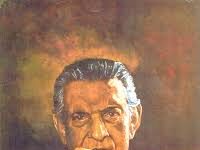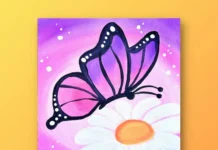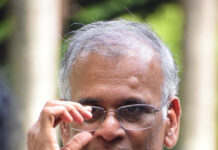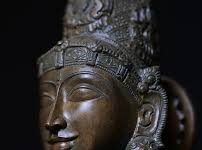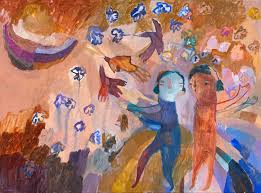
Forty years ago, when I entered the Tamil literary field as a young writer with a lot of dreams and enthusiasm, there was a particular belief that a writer should write about what he personally knew and felt. It was the belief of modernism; for them, the life and personality of the writer are more important than the text. A literary text is considered the direct emergence of that writer’s personality. The personal lives of Kafka and Camus are discussed more than their texts; some lives, like the ones of Van Gogh, are celebrated like great legends.
In 1988, I engaged in an interesting conversation with Sundara Ramasamy, with whom I was in constant contact. I was extremely bored with the dry, realistic stories depicting poverty, the meaninglessness of life, and other petty things like nostalgia.
Once when I said I want to write ghost stories like Edith Wharton, Sundara Ramasamy asked me whether I have met ghosts personally to write about them. I replied, “You wrote a lot about death often, and the major theme of modernism is death. How do you write it without firsthand experience?”
I was told that a writer should write what he knows well, and I replied that I would rather write what I don’t know because I am only writing to learn new things. Later I discovered that I was talking about the core ideas of postmodernism, which negates the modernist idea that writing is the direct expression of the writer. The slogan ‘death of the author’ inspired me at that time.
I began to write stories belonging to various genres such as crime, mythological, historical, horror, satire, and science fiction. I found that Pudumaippithan, the founding father of modern Tamil literature, wrote all types of stories.
At that time, some writers initiated a movement they call “elimination of story from the story.” So they wrote simple narrative pieces, which are nothing more than blobs of prose. During that period, the general theme of stories revolved around the day-to-day experiences of a peasant, a jobless youth, or a bored housewife.
I believed in the particular form of narration that we call ‘story.’ It is not as simple as these writers believe. It is not just a technique of narration. It has thousands of years of evolutionary history, and actually it is a part of the human psyche. It’s a thing like the house, or a plow, or a cart. It has a basic form, and we can explore its unlimited new possibilities.
So I started to write stories with a solid theme and plot. I firmly believe that any form of narration can effectively transform and convey a compelling story without significant loss. My stories were told as oral narration; they were made into plays and movies. They never lose their original fire because they have basic quests and visions expressed as human drama, not narration techniques. I approach writing as a mission, not as a game with the readers. I am on an everlasting quest, and I involve my readers in it.
As postmodernists said, I believe literature is nothing more than narration; biographies and autobiographies are also just narrations. There is basically no difference between a novel and a biography. Every way of narration has its own mode for it, and it manipulates events, data, and emotions to express the truth it conceives. So writing a personal account of life as a novel is not different than writing a novel about something that happened in the far future or in the Stone Age. In every type of fiction, I am expressing my personal truth by creating a reality of my own through language using my imagination.
While the modernists accused me of writing “interesting fiction,” I consider myself a classicist, and now I’ve found a more apt word, “postpostmodernism” or “transmodernism,” which is beyond postmodernism. I am writing historical novels, political novels, dark realistic works, and pleasant pieces. I am writing for children and young adults. I once stated that I would not hesitate to write pornography if it allowed me to explore some inner truth.
But how can I differentiate these works from simple commercial writing? Is there still a difference between pop fiction and literature? Postmodernists may say no, but I consider myself a transmodernist, and I would say that there is a major difference. Pulp fiction is mainly based on the needs and tastes of the reader, who is a consumer; it is a consumer product. A literary piece is also sold and bought, but it is still not a consumer product, and it is based on the writer. He is expressing himself through his writing, and while writing, there was no reader before him. It is a very personal thing while being written. It becomes a sharing or conversation only after a similarly minded reader finds it. It is an obvious fact that every literary writer knew very well; no academic analysis or theoretical explanation can deny it from a literary reader either.
I am writing all kinds of fiction only to discover myself in different planes of life; I am trying to find my inner expression at all levels of human consciousness. I don’t write ghost stories to terrify you. What is the meaning of making someone scared with words? The question is, why did this form of story emerge in the minds of human beings, and why is it continuing in our cultural memories? There is something queer in it—psychological, symbolical, and esoteric.
Eerie and fearsome things are actually some of our deepest expressions. They reveal a sort of diabolical truth about human existence. I am trying to explore the depth and truth that exist within it. I would describe this perspective as applicable to all of my stories. They are my travels into my inner self and the depth of my culture through various ways. I am using different tools, such as knives and forceps, to perform this unconventional surgery.
These stories never bore a common reader because they have strong plots and minute narrations. I will be delighted if a reader considers these stories a way to travel to his depths as well
Here we have an infinite fabric of individual events, which we refer to as life, and we are attempting to make it logically interconnected by weaving a coherent texture of meaning under it. These stories are a small part of that equally infinite endeavor called literature.
I express my gratitude to my translators, Sri S. Kumar and Sri Baskar Avineni, for their dedication in translating my works into Telugu. I also thank Sri Geetha Ramasami for publishing these stories
.
Jeyamohan

